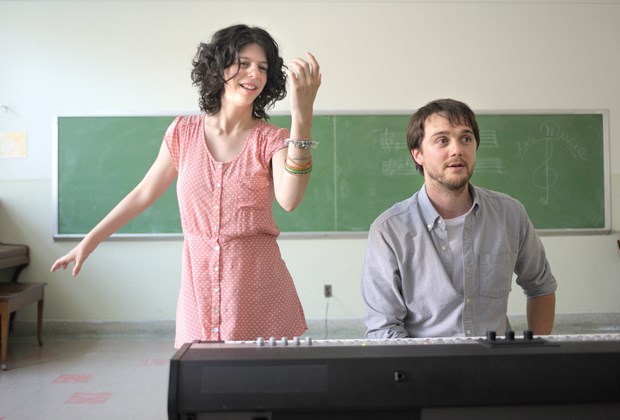Gabrielle. Written and directed by Louise Archambault. Starring Gabrielle Marion-Rivard and Alexandre Landry.
Rating: 8 (out of 10) Canada's submission for Best Foreign Language Film at this year's Academy Awards is Gabrielle, an ordinary and extraordinary love story.
Gabrielle (Gabrielle Marion-Rivard) lives in a group home for developmentally challenged adults but desperately wants what other young women her age have: independence, a family, true love. She has already found the latter in Martin (Alexandre Landry) a fellow singer in her choir.
But love and sexuality among the intellectually disabled is a tenuous topic. Everyone from the couples' social workers to their respective families weigh in on their fitness for a sexual relationship. Gabrielle's sister Sophie (Melissa Desormeaux-Poulin) is pleased for Gabrielle; on the other side of the spectrum is Martin's mother, who asks pointblank if Gabrielle has been sterilized.
Sophie is Gabrielle's advocate, her cheerleader and, occasionally, her reality check. One day she leaves Gabrielle to fend for herself in the apartment to show her that she can't leave the group home and live alone, with near-tragic results. But if Sophie is Gabrielle's crutch, the dependence goes both ways: Sophie's all-encompassing role as caretaker may be stopping her from making the leap to move to India with her beau. Sophie just can't cut the cord.
The love story takes place as an important concert - the Mondial Choral summer festival - looms. Quebecois singer Robert Charlebois will be the guest performer with
Gabrielle and Martin's choir and is eagerly anticipated by its members. Martin singing Charlebois' "Ordinaire," a song about yearning to be heard and understood, is one of the film's more touching moments.
Landry won Best Supporting Actor in a Canadian Film by the Vancouver Film Critics Circle earlier this month for his endearing performance as Martin.
On and off screen Gabrielle has Williams Syndrome, which, among other things, predisposes people to an affinity for music and perfect pitch. Director Louise Archambault was inspired by Les Muses, a Montreal arts centre that trains developmentally disabled people in voice, dance and drama. Archambault eventually abandoned the framework of her original idea, including a professional lead actress, and structured much of the film around Gabrielle's improvisation and spontaneity. Several supporting actors in the film are also from Les Muses.
At times the feature film plays like a documentary about the myriad ways in which we marginalize people outside our definition of "normal." Gabrielle also very movingly conveys messages about the transformative power of music and the need of everyone to be loved.



